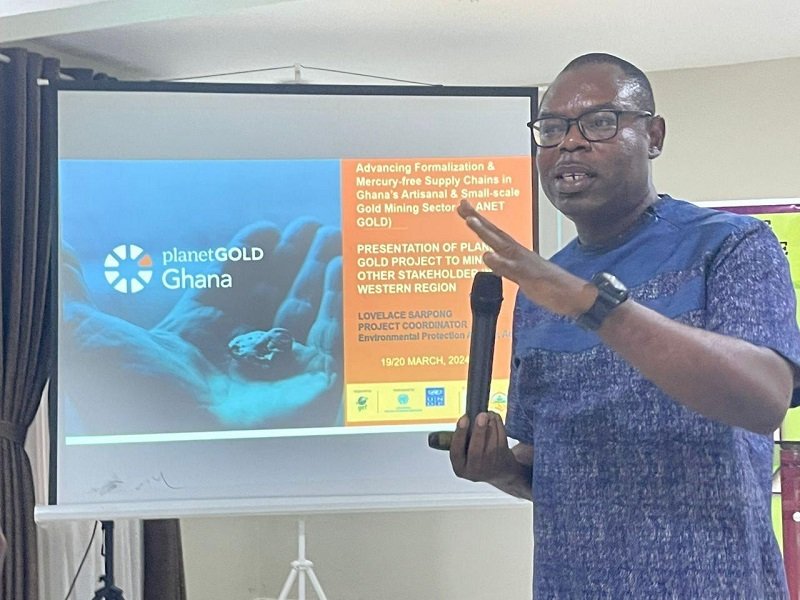Hot!
President Akufo-Addo appoints COP Christian Tetteh Yohuno as Deputy IGP In-charge-of Operations

The President of the Republic, Nana Addo Dankwa Akufo-Addo, has appointed Commissioner of Police (COP) Mr. Christian Tetteh Yohuno as the new Deputy Inspector-General of Police in-charge-of Operations.
This appointment is pursuant to the advice of the Police Council at its meeting held yesterday, Wednesday, July 17, 2024, during which COP Yohuno’s exceptional credentials and dedication to duty were acknowledged.
COP Christian Tetteh Yohuno is a distinguished law enforcement officer, with a career spanning over three decades, and has held various key positions within the Ghana Police Service.
President Akufo-Addo extended his heartfelt congratulations to COP Christian Tetteh
Yohuno on his well-deserved appointment, and wished him the very best in the discharge of his duties.
Hot!
Youth urged to take proactive stance on ozone depletion

•Mr Joseph Amankwah, first counting from, some officials from EPA and UNDP in group picture with the student
Mr Joseph Amankwah, the Director of Ozone Layer and Climate Change at the Environmental Protection Agency (EPA), has urged the youth to take a proactive stance on issues related to ozone depletion, emphasising that their future would be most affected by its consequences.
Speaking during a student engagement event at the Ghana Secondary School (GHANASS) in Koforidua, he highlighted the critical role young people played in tackling climate-related challenges.
Mr Amankwah explained that human activities, such as the use of certain chemicals, were significantly contributing to the depletion of the ozone layer and driving climate change.
He said it was important to educate the youth on these issues, encouraging them to share this knowledge with their families to foster a broader understanding and active participation in climate action.
He urged the education sector to integrate lessons on the ozone layer, the causes of its depletion, and its links to climate change into the curriculum.
The event, organised by the EPA in collaboration with the United Nations Development Programme (UNDP), was designed to foster environmental awareness and promote a sense of responsibility among young people.
Mr Amankwah noted that ozone layer depletion was affecting everyone, including children, as it alters weather patterns and threatens the natural environment.
He highlighted the need for young people to develop ‘green skills’ to adapt to the challenges of climate change and to understand ways to combat it.
He added that World Ozone Day, observed every September, would focus on youth engagement in environmental issues, to help them understand the long-term consequences of ozone depletion and climate change.
Mr Amankwah also discussed the harmful impact of chlorofluorocarbons (CFCs), a major chemical contributor to ozone depletion.
He explained that household appliances such as refrigerators and air conditioners were common sources of CFC emissions in Ghana.
Many uncertified technicians work on these appliances, often releasing harmful chemicals into the atmosphere due to improper handling, he noted.
To address this, he urged appliance repairers to obtain proper certification and training, emphasising that unqualified repairs not only harm the environment but also endangered public health.
From Ama Tekyiwaa Ampadu Agyeman,
Koforidua
Hot!
Small-scale miners schooled on health hazards of mining with mercury

Mr Lovelace Sarpong (right) addressing the participants
Some Artisanal and Small-Scale Miners in the Ashanti and Central regions have been sensitised on the potential health dangers humans are exposed to with the use of mercury in gold processing.
The sensitisation which was organised by PlanetGOLD Ghana project was to raise awareness about the negative impacts on the use of mercury in mining activities.

According to the PlanetGOLD Ghana Project Coordinator, Mr Lovelace Sarpong, the use of mercury in artisanal small-scale mining pose health challenges that affects the nervous, digestive and immune systems, lungs and kidneys; and may be fatal.
Some Metropolitan, Municipal, and District Assemblies (MMDAs) that benefited from the exercise were Amansie Central, Asante Akim North, Amansie South, Amansie West, Bekwai, and Adansi North in the Ashanti Region, and Upper Denkyira East (Dunkwa-on-Offin) and Upper Denkyira West (Diaso) in the Central Region.
Additionally, he said inorganic salts of mercury were corrosive to the skin, eyes and gastrointestinal tract, and may induce kidney toxicity if ingested.
He stated that the PlanetGOLD Project has conducted several initiatives to raise awareness on reducing mercury exposure among artisanal and small-scale gold mining actors in the country.
It was to promote mercury-free mining practices in line with Ghana’s obligations under the Minamata Convention on Mercury, support the formalisation of the ASGM sector while advocating the adoption of the CRAFT Code and responsible supply chains, and raise awareness on the availability of mercury-free alternatives.
The Environmental Protection Agency (EPA) Area Head for Konongo, Mr Dawood Abbas, underscored the importance of government’s environmental regulations and EPA’s role in ensuring compliance within the ASGM sector.
He encouraged miners to prioritise environmental stewardship to gain community trust and secure a Social License to Operate (SLO) and reaffirmed the Agency’s commitment to enforce its commitments under the Minamata Convention.
BY Cecilia Lagba Yada







